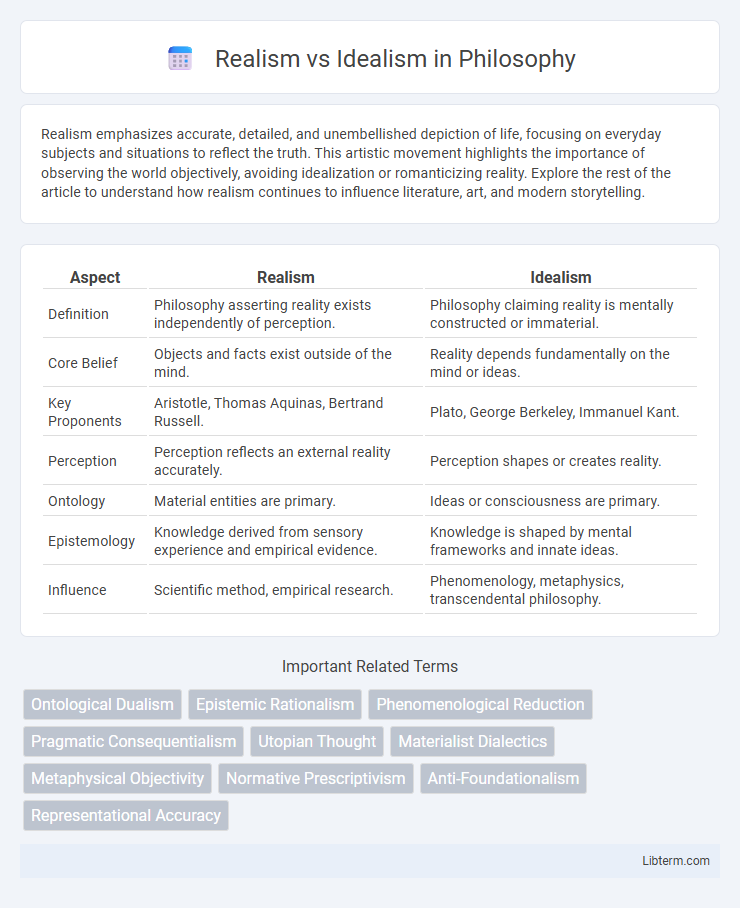Realism emphasizes accurate, detailed, and unembellished depiction of life, focusing on everyday subjects and situations to reflect the truth. This artistic movement highlights the importance of observing the world objectively, avoiding idealization or romanticizing reality. Explore the rest of the article to understand how realism continues to influence literature, art, and modern storytelling.
Table of Comparison
| Aspect | Realism | Idealism |
|---|---|---|
| Definition | Philosophy asserting reality exists independently of perception. | Philosophy claiming reality is mentally constructed or immaterial. |
| Core Belief | Objects and facts exist outside of the mind. | Reality depends fundamentally on the mind or ideas. |
| Key Proponents | Aristotle, Thomas Aquinas, Bertrand Russell. | Plato, George Berkeley, Immanuel Kant. |
| Perception | Perception reflects an external reality accurately. | Perception shapes or creates reality. |
| Ontology | Material entities are primary. | Ideas or consciousness are primary. |
| Epistemology | Knowledge derived from sensory experience and empirical evidence. | Knowledge is shaped by mental frameworks and innate ideas. |
| Influence | Scientific method, empirical research. | Phenomenology, metaphysics, transcendental philosophy. |
Introduction to Realism and Idealism
Realism emphasizes an objective reality independent of human perception, grounded in empirical evidence and observable phenomena. Idealism argues that reality is fundamentally shaped by the mind, suggesting that knowledge and existence depend on mental constructs or consciousness. These philosophies offer contrasting views on the nature of existence and the limits of human understanding.
Historical Origins of Realism and Idealism
Realism originated in ancient Greek philosophy, notably through the works of Plato and Aristotle, emphasizing the existence of an objective reality independent of human perception. Idealism emerged prominently with philosophers like George Berkeley and Immanuel Kant, who argued that reality is fundamentally shaped by the mind and ideas. The historical debate between Realism and Idealism reflects contrasting views on the nature of existence and knowledge, influencing metaphysics, epistemology, and political theory throughout history.
Core Principles of Realism
Realism centers on the belief that international relations are governed by competitive self-interest and the pursuit of power by sovereign states in an anarchic global system. It emphasizes the inevitability of conflict, the importance of military capability, and the prioritization of national security over moral or ideological considerations. Core principles include state sovereignty, the balance of power, and the acceptance of international politics as a zero-sum game.
Core Principles of Idealism
Idealism emphasizes the primacy of ideas, consciousness, and mental constructs as the fundamental reality shaping human experience and knowledge. Core principles of idealism include the belief that reality is mentally constructed or immaterial, that the mind actively interprets and organizes sensory data, and that ideals such as truth, beauty, and morality are absolute and universal. This philosophy contrasts with realism by asserting that external objects only exist insofar as they are perceived or conceptualized by the conscious mind.
Key Differences between Realism and Idealism
Realism emphasizes practical and tangible outcomes based on the inherent nature of the world, highlighting power dynamics and self-interest as central to international relations and decision-making. Idealism prioritizes moral values, ethical principles, and the potential for cooperation and progress through international institutions and norms. Key differences lie in Realism's focus on state-centric power and conflict versus Idealism's belief in human nature's capacity for good and the transformative power of ideals.
Realism vs Idealism in Philosophy
Realism in philosophy asserts that reality exists independently of human perception, emphasizing objective truth and the existence of external entities. Idealism argues that reality is fundamentally mental or immaterial, positing that knowledge and existence depend on consciousness or ideas. The debate between realism and idealism centers on the nature of reality and the relationship between mind and world, influencing metaphysics, epistemology, and the theory of knowledge.
Realism vs Idealism in International Relations
Realism in international relations emphasizes state sovereignty, power struggles, and the anarchic nature of the global system, where states act primarily in their self-interest to ensure survival. Idealism promotes cooperation, international norms, and the role of ethical values and institutions in fostering peace and global order. The ongoing debate contrasts Realism's focus on power politics with Idealism's belief in the potential for collective progress through diplomacy and international law.
Impact of Realism and Idealism on Society
Realism and idealism shape societal values and decision-making by influencing perspectives on human nature and governance. Realism prioritizes practical and material concerns, fostering policies centered on security, power, and economic stability, which can lead to pragmatic societal structures but also potential neglect of moral ideals. Idealism inspires social reform and progressive movements by emphasizing ethical principles, justice, and the potential for human perfection, driving cultural advancement and advocacy for human rights despite sometimes impractical expectations.
Contemporary Debates: Realism or Idealism?
Contemporary debates in international relations center on the efficacy of realism versus idealism in addressing global challenges such as security, human rights, and environmental issues. Realism emphasizes state sovereignty, power politics, and national interest as primary drivers, while idealism advocates for international cooperation, ethical norms, and global governance institutions. Scholars continue to analyze empirical case studies from conflicts, trade policies, and climate agreements to determine which paradigm best explains state behavior in the current multipolar world order.
Conclusion: Finding Balance between Realism and Idealism
Balancing realism and idealism involves integrating practical strategies with visionary goals to achieve sustainable progress. Embracing realism ensures grounded decision-making based on current conditions, while idealism inspires innovation and long-term aspirations. Effective leadership and policy-making thrive by harmonizing these perspectives to address complex challenges dynamically.
Realism Infographic

 libterm.com
libterm.com